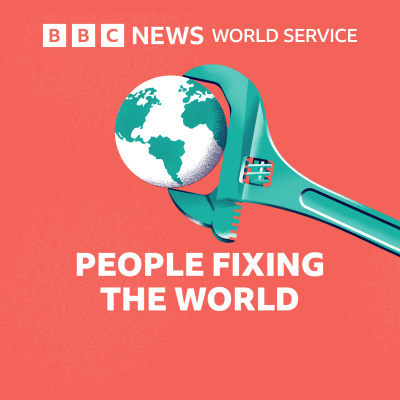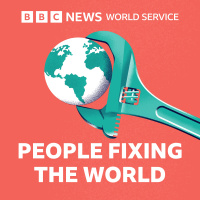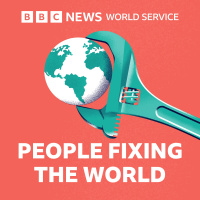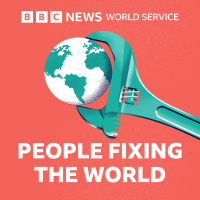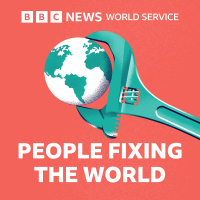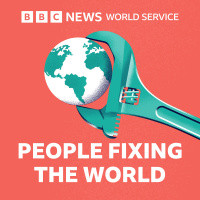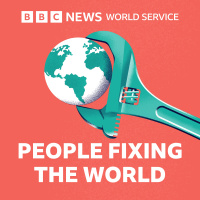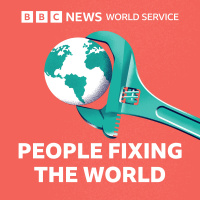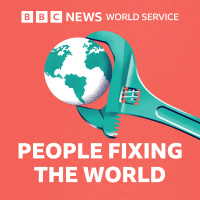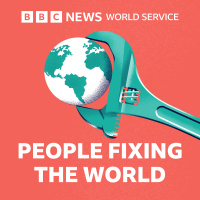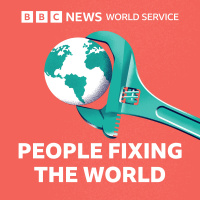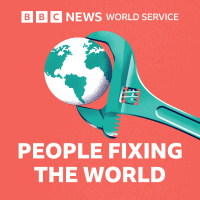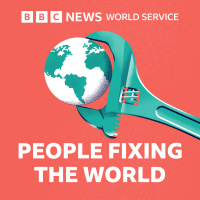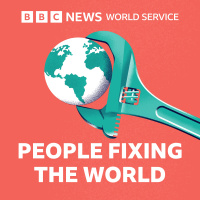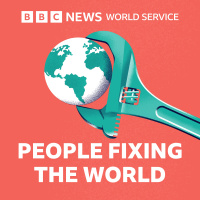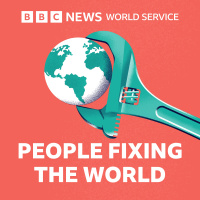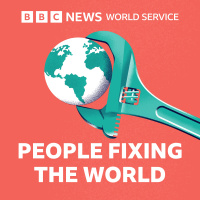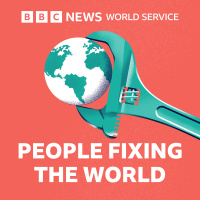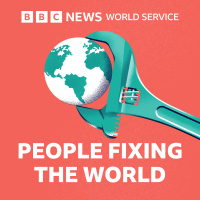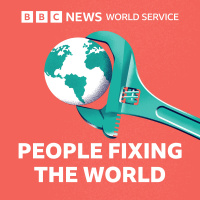Sinopsis
Brilliant solutions to the worlds problems. We meet people with ideas to make the world a better place and investigate whether they work.
Episodios
-
Kangaroo care for premature babies
04/04/2023 Duración: 24minPremature babies often need a lot of expensive specialised care - but that isn’t always available. So, doctors in Colombia are teaching mothers to look after their babies in a similar way that kangaroos look after their own young. It’s called "kangaroo mother care" and instead of being in an incubator, babies are wrapped tightly against their mother’s skin. The technique was developed in Bogota in the late 1970s as a response to overcrowding in hospital maternity units. There weren't enough incubators and around 70% of premature babies didn’t survive.Doctors started using this simple skin-to-skin method. They found it wasn't only saving babies lives but was helping them to thrive. Now kangaroo care has spread around the world. Presenter: Myra Anubi Reporter: Zoe Gelber Series producer: Tom Colls Sound mix: Hal Haines Editor: Richard Vadon Email: peoplefixingtheworld@bbc.co.uk Image: A baby in the kangaroo position
-
Sports fan solutions
28/03/2023 Duración: 26minFootball in Germany had a big problem with violent, racist, far-right supporters. But a social innovation, organised and run by fans, has been credited with helping to change the dynamic in the stands.“Fan projects” attract young fans with the promise of youth clubs and cheap transport to games. We go to a game with a fan project in Dresden to see how it works.And from the US, we hear how one woman is on a mission to make ice hockey more accessible to black women.Presenter: Myra Anubi Reporter: Jessica Bateman Producer: Ann Hepburn Series producer: Tom Colls Sound mix: Hal Haines Editor: Richard VadonEmail: peoplefixingtheworld@bbc.co.uk Image: Ronald Beć
-
The people fixing childcare
21/03/2023 Duración: 23minA good childcare system is essential in most modern economies. Yet in many countries, childcare is only available to the wealthy, and the burden of care falls disproportionately on women - effectively barring them from the workforce.People often point to Scandinavian countries as the gold standard in childcare, but in other corners of the world people are working with women and communities to set up affordable childcare solutions - enabling mothers at the bottom of the income scale get back into the workforce and helping children get a head start.We travel to Burkina Faso to visit a project that brings mobile childcare to parents working as outdoor manual labourers – to benefit both the economy, children's safety and ensuring future generation get access to education. And we visit Nairobi’s informal settlements, where one company is breathing new life into existing childcare centres.Presenter: Myra Anubi Producer/Reporter: Lizzy McNeill Series Producer: Tom Colls Sound Mix: Gareth Jones Editor: Penny MurphyEm
-
Stopping harassment on public transport
14/03/2023 Duración: 26minHarassment and violence on public transport is a global issue. We look at initiatives aiming to make commuting safer.In Indonesia, we take a ride on the Pink Bus which serves only female passengers. The city has one the most dangerous transportations systems in the world for women, with high levels of harassment. The scheme hopes to provide them with a safer journey.And in Germany, we look at a new kind of CCTV that uses artificial intelligence to spot aggressive situations in real-time that’s soon to be trialled on trains in Germany. The company behind the technology says it could transform safety on the railways.Presenter: Myra Anubi Reporter: Farhana Haider Indonesia reporter: Nicky Widadio Series producer: Tom Colls Sound mix: Neva Missirian Editor: Richard VadonEmail: peoplefixingtheworld@bbc.co.uk Image: The Pink Bus (Getty Images)
-
Endometriosis: The search for solutions
07/03/2023 Duración: 24minReporter Rosie Blunt spent years getting help for her endometriosis - a condition which has symptoms including debilitating pain and infertility.She's on a quest to find new ways of treating the disease and bringing down diagnosis time.That mission takes her to Hungary to test out a medical centre that doubles as a thermal spa and meet Adrienn Salamon, who has created an app that's helping women get the information they need for an earlier diagnosis.Presenter: Myra Anubi Reporter: Rosie Blunt Series producer: Tom Colls Sound mix: Gareth Jones Editor: Penny MurphyEmail: peoplefixingtheworld@bbc.co.uk Image: Adrienn Salamon
-
Challenging attitudes to disability
28/02/2023 Duración: 24minAcross the African continent, people with disabilities are often stigmatised. The discrimination they face can impact their ability to go to school, find a job and even to feel safe.We look at the projects trying to change people’s attitudes and help people with disabilities flourish.We speak to Lilian Dibo Eyong, who is trying to change attitudes to people with disabilities in Cameroon.In Uganda, we visit the “silent café” - which is run by deaf people and you order in sign language.And we test out a virtual reality game designed in Nigeria that’s helping people understand what it’s like being a child with an autism spectrum disorder.Presenter: Myra Anubi Reporters: Eric Mugaju and Craig Langran Producer: Ann Hepburn Series producer: Tom Colls Sound mix: Hal Haines Editor: Penny MurphyEmail: peoplefixingtheworld@bbc.co.uk Image: Lilian Dibo Eyong
-
Getting refugees out of tents
21/02/2023 Duración: 30minMore than 100 million people have been forcibly displaced from their home around the world – fleeing conflict, natural disasters or persecution. Millions end up in refugee camps, living in tents.Around the world, designers and architects are trying to improve the lives of these displaced people, by improving the temporary homes they’re living in.From prefabricated shelters made using Swedish flat-pack design methods, to the homes made from scratch using local knowledge and materials, we meet the people trying to replace tents with homes that have a little more dignity.This is an updated repeat from August 2022.Presenter: Myra Anubi Reporter/Producer: Farhana Haider Producer: William Kremer Syria Producer: Ali Haj Suleiman Production Co-ordinator: Ibtisam Zein Sound mix: Hal Haines Executive producer: Tom Colls Editor: Penny MurphyPhoto credit: Ali Haj Suleiman Description: Kafirjalas IDP camp Idlib, Syria
-
Sea cucumbers fixing the world
14/02/2023 Duración: 25minMeet the oceans’ unsung hero.Human activity is having a huge impact on the world’s oceans - global warming, pollution from fish farms and damage from the fishing industry are all threatening some of the oceans most important ecosystems.But one creature might be able to help. The humble sea cucumber – an animal in the same family as starfish that looks like a lumpy sausage and lives on the ocean floor.We meet the Australian researchers using drones to count the cucumbers to understand how their poo is helping coral reefs. And in Madagascar, we speak to the local communities which are learning to sustainably farm the creature, protecting the seas and increasing their income along the way.Presenter: Myra Anubi Producer/Reporter: Lizzy McNeill Series producer: Tom Colls Sound mix: Annie Gardiner Editor: Penny MurphyEmail: peoplefixingtheworld@bbc.co.uk Image: Sea cucumbers (Getty Images)
-
The ring that could help save women’s lives
07/02/2023 Duración: 24minThousands of women are infected with HIV every week in Africa. Many can't persuade their partners to wear a condom, so it was hoped that a new form of protection could be a real game-changer.It's a small silicon ring which encircles the cervix and releases antiretroviral drugs, lowering the women’s risk of contracting HIV. Their partners aren't supposed to feel it, and so shouldn't even need to know it’s there.People Fixing the World first reported on the HIV ring five years ago. We find out what’s happened since.Presenter: Myra Anubi Reporters: Ruth Evans and Rosie Blunt Series producer: Tom Colls Sound mix: Annie Gardiner Editor: Penny MurphyEmail: peoplefixingtheworld@bbc.co.uk Image: Agnes holds up a dapivirine ring
-
Turning waste into power
31/01/2023 Duración: 24minFood waste from hotels and the heat from computers are being used to provide new sources of energy.In the fight against climate change, it is of vital importance to find new ways of making our energy go further.We visit Goa in India, to hear how food waste digesters - that turn waste into gas for cooking – are springing up everywhere.And in server centres around the world, we explore how the heat generated by running the internet is being re-used by local neighbourhoods.Presenter: Myra Anubi Reporters: Chhavi Sachdev and Craig Langran Producer: Claire Bates Series Producer: Tom Colls Sound Mix: Annie Gardiner Editor: Penny MurphyEmail: peoplefixingtheworld@bbc.co.uk Image: Richard Dias from Flycatcher Technologies
-
The healing power of forests
24/01/2023 Duración: 24minMeet the people using the healing power of forests to help improve physical and mental health. In forest therapy, people are taken into the woods and taught to use what they see, hear and smell to calm their minds. This kind of therapy has its roots in the Japanese practice of shinrin-yoku or “forest bathing”, which was developed in the 1980s.Myra is joined by Gary Evans, founder of the Forest Bathing Institute, to experience some of the relaxation techniques of forest bathing. We also hear how forests are helping people recover from depression and addiction in Hong Kong and Costa Rica, and look into the scientific evidence for its effectiveness. Presenter: Myra Anubi Reporter: Carla Rosch Producer: William Kremer Series producer: Tom Colls Sound mix: Hal Haines Editor: Penny MurphyEmail: peoplefixingtheworld@bbc.co.uk Image: A woman in a forest (Getty Images)
-
Plants fighting pollution
17/01/2023 Duración: 24minClearing up pollution can be a messy and expensive task, but around the world people are harnessing the power of plants to do the job for them.We hear how water hyacinths are going from hated weed to providing communities with a greener water filtration solution; how plants in the Niger Delta are helping rejuvenate land drenched in oil and devastated by fire and ask whether plants could be the future to more environmentally friendly mining.Presenter: Myra Anubi Reporter: Georgina Rannard Reporter/producer: Lizzy McNeill Producer: Zoe Gelber Series producer: Tom Colls Sound mix: Hal Haines Editor: Penny MurphyEmail: peoplefixingtheworld@bbc.co.ukImage: A water hyacinth (Getty Images)
-
Bringing dead languages back to life
10/01/2023 Duración: 26minAustralia used to be one of the most linguistically diverse places, with over 200 languages. Today, many of Australia’s indigenous languages are considered “highly endangered”. Inspired by his native language, Hebrew, Ghil’ad Zuckermann is a linguistics professor who is on a mission to revive Australia’s dead and endangered languages, painstakingly piecing them back together from historical documents. We speak to Ghil’ad and Shania Richards from the Barngarla community, whose language is being brought back from the brink. Presenter: Myra Anubi Reporter/producer: Josephine Casserly Producers: Claire Bates & Craig Langran Series producer: Tom Colls Sound mix: Annie Gardiner Editor: Penny MurphyEmail: peoplefixingtheworld@bbc.co.uk Image: Shania Richards from the Barngarla community
-
Fighting the megadrought
03/01/2023 Duración: 24minChile is in the midst of a “megadrought” – year after year of low rainfall which has turned farmland to desert and left communities struggling to survive.But in the midst of the crisis, people in Chile have found ingenious ways of collecting, saving and cleaning water.We visit the hillside fog nets, AI powered irrigation system and a high-tech desalination plant that are helping people survive and thrive when the rains don’t come.Presenter: Myra Anubi Reporter/Producer: Jane Chambers Series producer: Tom Colls Sound Mix: Gareth Jones Editor: Penny MurphyEmail: peoplefixingtheworld@bbc.co.ukImage: Daniel Rojas and his fog nets
-
Micro-homes and sobercoins
27/12/2022 Duración: 24minA charity in the UK is building temporary wooden homes with just three small rooms. The idea is to give people who’ve been sleeping rough or living in hostels a step on to the housing ladder. We visit some of these ‘micro-homes’ in England and hear about a community of ‘tiny homes’ in Los Angeles. Plus, we visit a project in Belgium that’s trying to persuade young people to drink alcohol in moderation. They've created ‘sobercoins’ which party-goers are given if they turn up at events sober – which they can then use to buy alcoholic drinks. Presenter: Myra Anubi Reporter/producers: Caroline Bayley and Richard Kenny Series producer: Tom Colls Sound mix: Hal Haines Editor: Penny Murphy Email: peoplefixingtheworld@bbc.co.uk Image: Eamonn and his micro-home
-
Grannies fixing the world
20/12/2022 Duración: 24minIn many communities grandmothers have a great influence on their families and communities. In Senegal we visit a project using grandmothers to give vital health information to adolescent girls and is also empowering them to influence men to stop practices like female genital mutilation. We also tell the story of the Granny Cloud, a team of volunteer grandmothers from all over the world, who used the internet to reach out to some of the world’s poorest children. Presenter: Myra Anubi Reporter/Producer: Farhana Haider Series producer: Tom Colls Sound mix: Annie Gardiner Editor: Penny Murphy Email: peoplefixingtheworld@bbc.co.uk Image: Grandmothers and girls from the The Grandmother Project, Senegal.
-
Board games fixing the world
13/12/2022 Duración: 24minCan playing board games help us fix real-world problems?All around the world, people play board games for fun. But in recent years, a new generation of designers have been creating games with a social purpose - to enable understanding about complex problems like climate change, inequality and deforestation, and collaboratively design strategies to solve them.We look at how a group of researchers from Switzerland are creating custom-made board games that help resolve environmental disputes, led by Professor Claude Garcia from ETH Zurich and Bern University of Applied Sciences. Local farmers, businesspeople and government officials play their own roles in the games – which have helped them find compromises that protect the natural world in Indonesia and the Congo Basin.And in London, we also get a first-look at Daybreak, a new cooperative board game designed by Matteo Menapace and Matt Leacock, who designed Pandemic - a game that helped people understand the spread of coronavirus. In Daybreak, they’ve used the
-
Sleep solutions
06/12/2022 Duración: 24minThe amount of sleep you get makes a huge difference to your life – don’t get enough and it can harm your health, productivity and decision making.But research also suggests that people on lower incomes sleep less, because of things like shift work, overcrowded housing and stress. So how do you improve the sleep of those most in need?We visit a project in the north of England which is recycling old mattresses to help sleep deprived families afford a decent slumber. Myra Anubi talks to a researcher studying the sleep of people living in informal settlements in India and are discovering the power of a little nap. And we find out about a project in Spain which is helping hospital patients sleep more soundly.Presenter: Myra Anubi Reporters: Josephine Casserly and Esperanza Escribano Producer: Craig Langran and Claire Bates Series producer: Tom Colls Sound mix: Hal Haines Editor: Penny MurphyEmail: peoplefixingtheworld@bbc.co.ukImage: A bed (Getty Images)
-
The body suit that stops muscle spasms
29/11/2022 Duración: 25minIn 2021 a video clip showing a seemingly magical bodysuit when viral on the internet. The clip showed a man who suffered constant convulsions quelling them after activating electrical pads on the suit. Many suggested the video was a hoax, but the Molli suit is real, and it is helping people with a range of conditions from cerebral palsy to multiple sclerosis. William Kremer finds out more.Meanwhile in Japan, one rehabilitation doctor has been on a quest to design a new kind of wheelchair. People with spinal cord injuries or conditions like Parkinson’s propel the Cogy wheelchair by pedalling, not pushing with their arms – allowing them to do physiotherapy while moving around.Presenter: Myra Anubi Reporters: William Kremer and Cheng Herng Shinn Producer: Zoe Gelber Series producer: Tom Colls Sound mix: Gareth Jones Editor: Penny MurphyEmail: peoplefixingtheworld@bbc.co.ukImage: The Molli suit (Credit: Ottobock)
-
The World Cup of football solutions
22/11/2022 Duración: 24minAs the World Cup kicks off in Qatar, we look at the initiatives around the world which are using football as a way to solve problems off the pitch. We meet the people using the beautiful game to support men with their mental health in the UK, bring people together after conflict in Iraq and build the confidence of girls in the Netherlands.Presenter: Myra AnubiReporters: Jo Casserly and Craig Langran Series producer: Tom Colls Sound mix: Hal Haines Editor: Emma RipponEmail: peoplefixingtheworld@bbc.co.ukImage: Roxanne ‘Rocky’ Hehakaija
